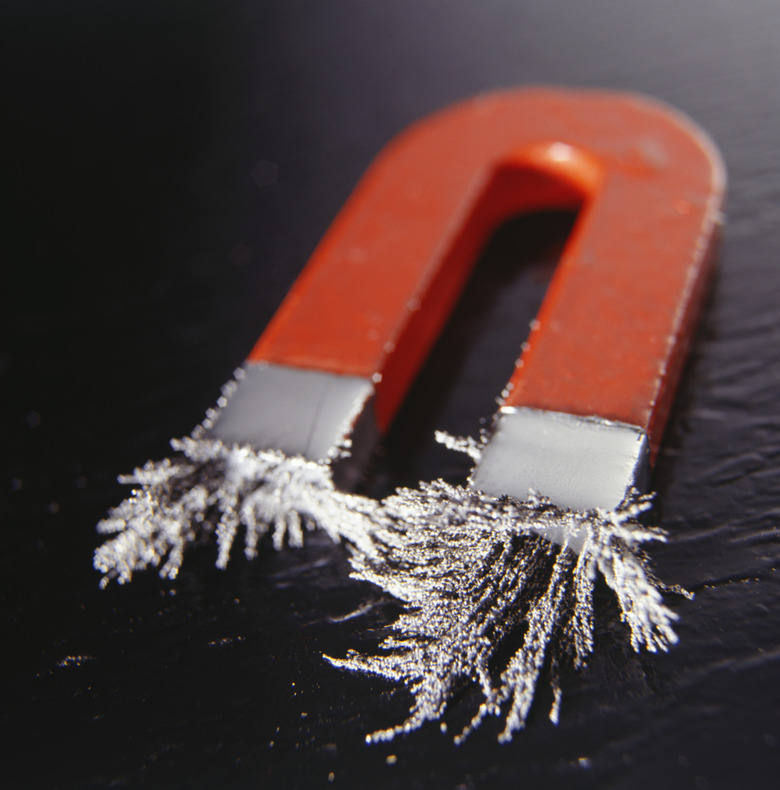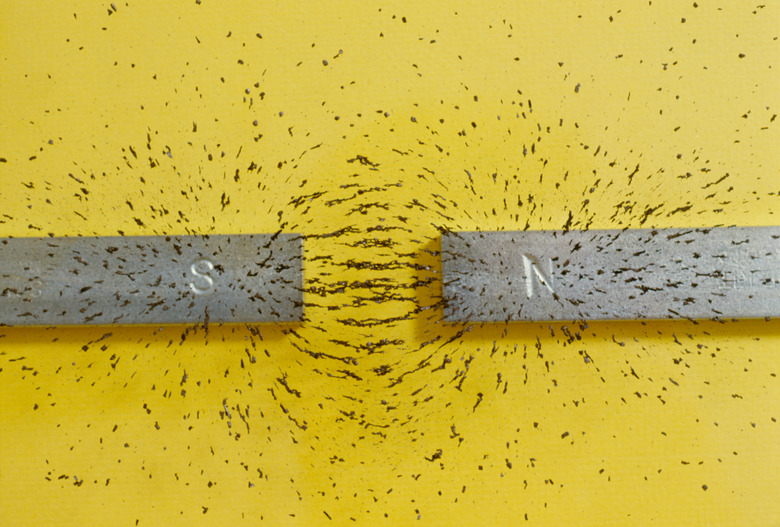Magnetic Levitation Projects For Kids
It's not a bird, a plane or even Superman; it's a bullet train. A maglev train levitates above the ground and is propelled at speeds of up to 300 miles per hour by powerful superconducting electromagnets. Experimenting with maglev models and other magnetic levitation projects is a good way for children to learn about magnetism and electricity.
Floating Paper Clips
Floating Paper Clips
Ferromagnetism is a natural force created by the motion of the electrons. In most elements the spinning electrons are paired with other electrons moving in opposite direction. Some metals, such as iron, have most of their electrons moving in the same direction. This creates a field of lines of magnetic force which can be demonstrated using iron filings and a permanent magnet. Metals which are attracted to a magnetic field are called ferromagnetic metals, according to Georgia State University.
A way to demonstrate the attraction of metals to a magnetic field is to do the floating paper clip experiment. The student attaches a permanent magnet to a metal bracket mounted on a shelf or box. He or she will then tie a piece of string to a paper clip and place it underneath the magnet. The magnet causes the paper clip to rise up and float at the end of the string. The kids can test the strength of the magnetic attraction by pulling on the string to see how far away from the magnet the paper clip will float.
Diamagnetic Levitation
Diamagnetic Levitation
Diamagnetism is magnetic repulsion. Graphite, some metals such as lead and bismuth and nearly all organic materials are diamagnetic because they repel magnetic forces. All organic material exhibits a weak diamagnetic force which repels magnetism. One experiment that graphically demonstrates this uses a live frog suspended over a powerful electromagnet, according to the High Field Magnetic Laboratory.
Kids can demonstrate diamagnetic repulsion by building a project to levitate a small rare earth magnet between two graphite plates. You can buy the parts for the project as a kit or build your own. Two pieces of pyrolitic graphite are mounted on a wooden frame and a series of inexpensive ring magnets are suspended underneath them to counter the force of gravity on the experiment. A small rare earth magnet is then placed in between the graphite plates where it will float as it is repelled by the graphite.
Floating Pencils
Floating Pencils
A simple project to demonstrate magnetic levitation uses six ring magnets, a pencil and some modeling clay. Have the kids attach four of the ring magnets to a flat surface with some modeling clay. Make sure the magnets are spaced an equal distance apart and have the same polarity facing up. Two ring magnets are placed onto the pencil so that they are the same distance apart as the two pairs of magnets on the flat surface. Attach a playing card to the table top behind the magnets with some clay so the pencil point can rest against it. The kids can now place the pencil above the ring magnets and watch as it levitates above the table top.
Levitating Train Models
Levitating Train Models
Magnetic fields of the same polarity repel each other. If you place the North poles of two magnets near each other they will push away from each other. A similar concept is in use in the maglev trains of Europe, Japan and China.
Kids can build their own model maglev trains using some strip magnets, PTFE tape and polystyrene foam. The strip magnets are taped onto a piece of polystyrene foam with the same polarity facing up and the track is surrounded by walls made of more polystyrene foam. The train is a piece of foam with permanent magnets glued on the bottom with the same polarity facing down as the track has facing upwards. Place the train down over the track and give it a gentle push to make it glide down the track. The PTFE tape along the walls makes the train slide more smoothly.
Cite This Article
MLA
Daniels, Ronnie. "Magnetic Levitation Projects For Kids" sciencing.com, https://www.sciencing.com/magnetic-levitation-projects-kids-12099188/. 24 April 2017.
APA
Daniels, Ronnie. (2017, April 24). Magnetic Levitation Projects For Kids. sciencing.com. Retrieved from https://www.sciencing.com/magnetic-levitation-projects-kids-12099188/
Chicago
Daniels, Ronnie. Magnetic Levitation Projects For Kids last modified March 24, 2022. https://www.sciencing.com/magnetic-levitation-projects-kids-12099188/


